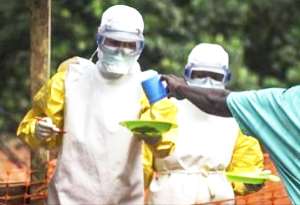
A Senior Public Health Consultant, Dr Sylvia Josephine Anie, has explained why there is no treatment or cure for Ebola after 40 years of its discovery within the West African sub-region.
Addressing a public lecture to commemorate the fifth anniversary of the Western regional branch of the Old Vandals Association, Dr Anie noted that Ebola is not a single virus but five different strains or species.
The topic for the lecture was 'Ebola, What More There Is To Know'.
She explained that as with influenza of HIV, each species of Ebola carried different surface proteins that could be targeted by human immune systems.
'Therefore, if you happen to mount an immune response against species one of Ebola, it would most likely not be protective against species 2, 3, 4 and 5,' she indicated.
She added that boosting ones immune systems with the right kind of nutrition, exercise and avoiding excessive alcohol could be a good defence to the Ebola virus.
She mentioned that currently, no specific therapy is available that has proved efficacious in the treatment of Ebola haemorrhagic fever.
'Surgical intervention generally follows a mistaken diagnosis in which Ebola-associated abdominal signs are mistaken for a surgical abdominal emergency. Such a mistake may be fatal for the patient and for any surgical team,' she added.
Dr Anie noted that there are no commercially available Ebola vaccines, however, she added that a recombinant human monoclonal antibody directed against the virus had been demonstrated to possess neutralising activity.
'Work on a vaccine continues and the current expectation is to wait for the development of 'Zmapp' vaccine which apparently shows promise for Ebola treatment,' she stressed.
She revealed that the World Health Organisation had estimated that over one million people are likely to be infected, adding, 'The rates of infections are truly exponential.'
Dr Anie noted that the WHO had declared the current situation as an international emergency, adding that a current report by the Oxford University has mapped out 15 countries including Ghana as one most at risk of an Ebola outbreak in West, Central and East Africa.
She said burial ceremonies where mourners had direct contact with the dead must also be curtailed or avoided to stop the spread of the disease.
'It is imperative that all citizens understand and bear in mind the signs and symptoms of the Ebola virus and actively seek for treatment,' she stressed.
Other speakers were Dr John Nkrumah Mills and Godfred Awere Nyante, who also spoke on the history of the disease and some preventive measures.
From Emmanuel Opoku, Takoradi




 Dumsor: Don't rush to demand timetable; the problem may be temporary — Atik Moha...
Dumsor: Don't rush to demand timetable; the problem may be temporary — Atik Moha...
 Space X Starlink’s satellite broadband approved in Ghana — NCA
Space X Starlink’s satellite broadband approved in Ghana — NCA
 2024 election will be decided on the grounds of the economy; choice of running m...
2024 election will be decided on the grounds of the economy; choice of running m...
 Dumsor: We're demanding less; just give us a timetable — Kwesi Pratt to ECG
Dumsor: We're demanding less; just give us a timetable — Kwesi Pratt to ECG
 Do I have to apologise for doing my security work, I won’t – Simon Osei-Mensah r...
Do I have to apologise for doing my security work, I won’t – Simon Osei-Mensah r...
 All my businesses have collapsed under Akufo-Addo — NDC Central regional chair
All my businesses have collapsed under Akufo-Addo — NDC Central regional chair
 Military, Prison Officers clash in Bawku, three injured
Military, Prison Officers clash in Bawku, three injured
 GRA-SML contract: MFWA files RTI request demanding KPMG report
GRA-SML contract: MFWA files RTI request demanding KPMG report
 Court threatens to call second accused to testify if NDC's Ofosu Ampofo fails to...
Court threatens to call second accused to testify if NDC's Ofosu Ampofo fails to...
 Family accuses hospital of medical negligence, extortion in death of 17-year-old...
Family accuses hospital of medical negligence, extortion in death of 17-year-old...
